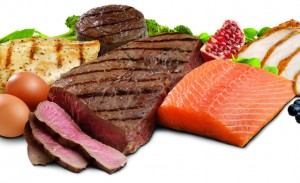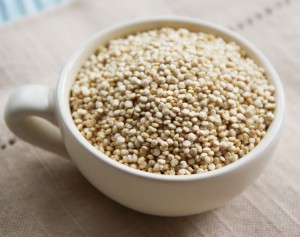By Amme Hazari MS and Mike Ormsbee PhD CSCS CISSN.
Nutrition and exercise go hand in hand, there’s no doubt about that. Everybody wants the fit body composition where even your reflection makes you do a “double take”, and casting directors are calling  begging you to appear on the next season of Jersey Shore. Ok maybe this doesn’t apply to everybody, but the point is, regardless of your motives, most people share the common goal of desiring that perfect body. Here are some helpful first steps towards that goal.
begging you to appear on the next season of Jersey Shore. Ok maybe this doesn’t apply to everybody, but the point is, regardless of your motives, most people share the common goal of desiring that perfect body. Here are some helpful first steps towards that goal.
Whether you are endurance training (swimming, running, cycling etc.) or resistance training (weight lifting), both require greater protein intake. We will focus on vegetarians who are aiming to achieve hypertrophy (an increase in size of the muscle fibers) using resistance training and protein intake, both of which are crucial. If you are eating healthy and exercising, you will begin to see the benefits in no time. The vegetarian cuisine may cause more of a challenge in obtaining that ideal lean body mass, not because there isn’t substantial protein to be found, but because most foods are ‘incomplete’ protein sources compared to animal products.
What are the experts saying?
According to the RDA requirements, you should consume 0.8 grams of protein per kilogram of body weight. However, if you  are exercising more protein intake may be required, otherwise your body may risk not obtaining the nutrients required to maintain a positive protein balance. It may be necessary to take 1.2 to 1.7 grams of protein per kilogram of body weight in order to prevent muscle degradation during a resistance training program. Of course the amount varies depending on your goal.
are exercising more protein intake may be required, otherwise your body may risk not obtaining the nutrients required to maintain a positive protein balance. It may be necessary to take 1.2 to 1.7 grams of protein per kilogram of body weight in order to prevent muscle degradation during a resistance training program. Of course the amount varies depending on your goal.
Getting from Bruce Banner to the Hulk
Want to see faster gains? Then make sure you consume protein 30-45 minutes prior to exercise, so that your body is simultaneously tearing and synthesizing muscle fibers during the workout. Whey protein, which is vegetarian friendly, taken before exercise has shown the same anabolic affects as after exercise (5). Other studies even showed that consuming the essential amino acids and carbohydrates mutually before exercise actually had a greater effect on protein synthesis than after exercise (4)
In order to gain muscle hypertrophy, it is critical to consume protein after resistance training as well. Studies show the increased benefits of immediate protein intake versus prolonged intake (2+ hours) after your workout (2). Immediate ingestion shows a higher net protein synthesis which promotes hypertrophy and increases strength. This is because exercise increases blood flow, which therefore increases the transport rate of amino acids. Your blood flow is the highest right after exercising, which produces a “window of opportunity” which lasts about 30-45 minutes. By taking advantage of this opening, you can achieve a significant increase in net protein turnover. This answers the when, but now we must address how much protein intake is optimal.
For non-vegetarians, it does not require much thought in putting a diet together, as meat is a rich source of protein. For vegetarians, on the other hand, finding good sources of protein presents more of an obstacle but can be quickly and efficiently achieved. It has been shown 20 grams of protein is sufficient for maximal protein synthesis (1), which can be easily satisfied by a protein shake and comes in many flavors. For those with a sweet tooth, there are even dessert flavored shakes that when mixed with milk an additional protein is provided. And don’t feel limited to taking them only pre or post workout; why not take a shake for breakfast or figure a way to incorporate them throughout your daily meals. This way it can be a low calorie meal to feed the hunger and a great way to increase daily protein intake.
O Protein, Protein, Wherefore Art Thou Protein
Some of the highest concentrations of protein can be found in tofu, veggie dogs/burgers, whole grains, lentils, and various types of beans, especially soy beans. Nuts, almonds, peanut butter are also good protein-packed snacks. If you are lactose-tolerant then milk, yogurt and cheese are valuable sources too. There are also smaller doses in common staple foods such as rice, vegetables and bread. These which are complementary protein and the root of many vegetarian meals and when combined form complete proteins.
 Quinoa, considered to be a whole grain, has an exceptional amount of protein. It is one of the very few sources to be a “complete” protein. In just one cooked cup you will find a whopping 18 grams of protein containing all the essential amino acids (3). Kidney beans are another great source. In just one cup of kidney bean you will find 13.4 grams of protein (3).
Quinoa, considered to be a whole grain, has an exceptional amount of protein. It is one of the very few sources to be a “complete” protein. In just one cooked cup you will find a whopping 18 grams of protein containing all the essential amino acids (3). Kidney beans are another great source. In just one cup of kidney bean you will find 13.4 grams of protein (3).
Try getting creative with your protein sources, as many can be incorporated into delicious cultural dishes. For example, tofu is not everyone’s favorite, but only half a cup contains over 10 grams of protein (3).Mixing tofu into a stir-fry can be a savory option for a meal. As a “veggie machine” myself, I absolutely love vegetarian burgers and hot dogs, and it is definitely worth a try. These foods effectively provide 10-16 grams of protein. On top of that, they are relatively quick and easy to prepare.
Let the journey begin to your goal of rocking that sexy outfit one day. Find a strength training regimen tailored to fit your needs, and remember to consume adequate protein both pre and post workout. Try to incorporate more protein into your daily meals and snacks. Following these simple rules will have you feeling stronger, more motivated and confident. Get your protein on!
References
1. DR M, Daniel R. Ingested protein dose response of muscle and albumin protein synthesis after resistance exercise in young men. Am.J.Clin.Nutr. 89 (1) 161, 2009.
2. Esmarck, B., Andersen, J. L., Olsen, S., Richter, E. A., Mizuno, M. and Kjær, M. Timing of postexercise protein intake is important for muscle hypertrophy with resistance training in elderly humans. The Journal of Physiology, 535 301–311, 2001.
3. Hackett, J. (n.d). How to get protein on a vegetarian diet. About.com. Retrieved October 24, 2011, from http://vegetarian.about.com/od/healthnutrition/tp/protein.htm.
4. Tipton, K, Rasmussen, B, Miller, S, Wolf, S, OwenStovall, S, Petrini, B, Wolfe, R. Timing of amino acid-carbohydrate ingestion alters anabolic response of muscle to resistance exercise. Am.J.Physio: Endocrinology and Metabolism 281 (2) E197-E206, 2001.
5. Tipton, K, Elliott, T, Cree, M, Aarsland, A, Sandford, A, Wolfe, R. Stimulation of net muscle protein synthesis by whey protein ingestion before and after exercise. Am.J. Physio: Endocrinology and Metabolism 292 (1) E71-E76, 2007.



